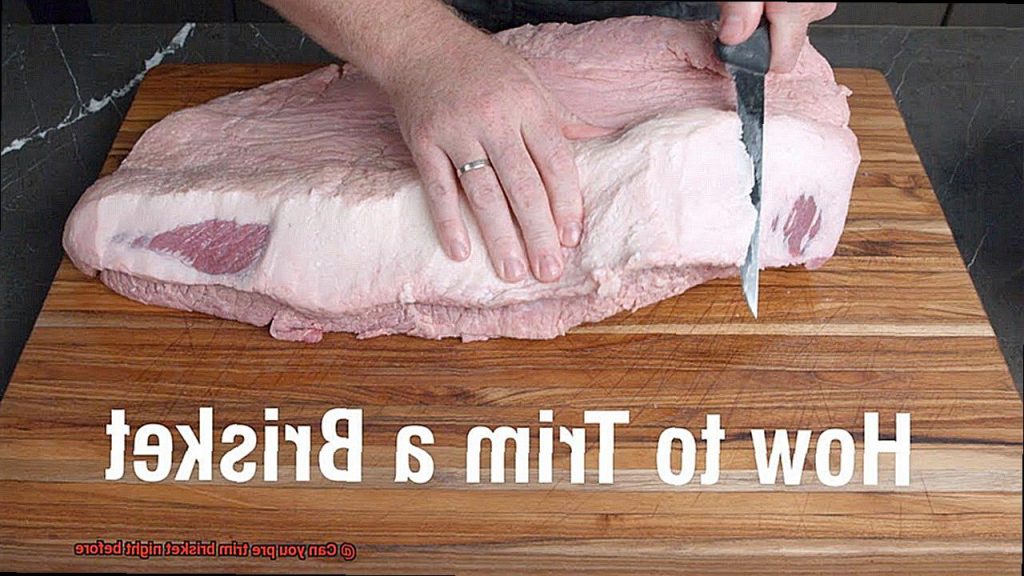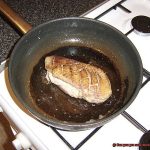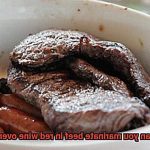Do you live for that slow-cooked, melt-in-your-mouth brisket? Well, my friend, if you want to up your game, listen up.
We’re about to tackle the burning question: can you pre-trim your brisket the night before? And guess what?
The answer is a big fat YES. Pre-trimming your brisket ahead of time can actually take your cooking skills to the next level.
It gives you more time to focus on those mouthwatering flavors and tender textures during the actual cook. So grab a seat, because in this blog post, we’re going to dive deep into the benefits of pre-trimming, dish out some handy tips, and address any concerns that might be sizzling in your mind.
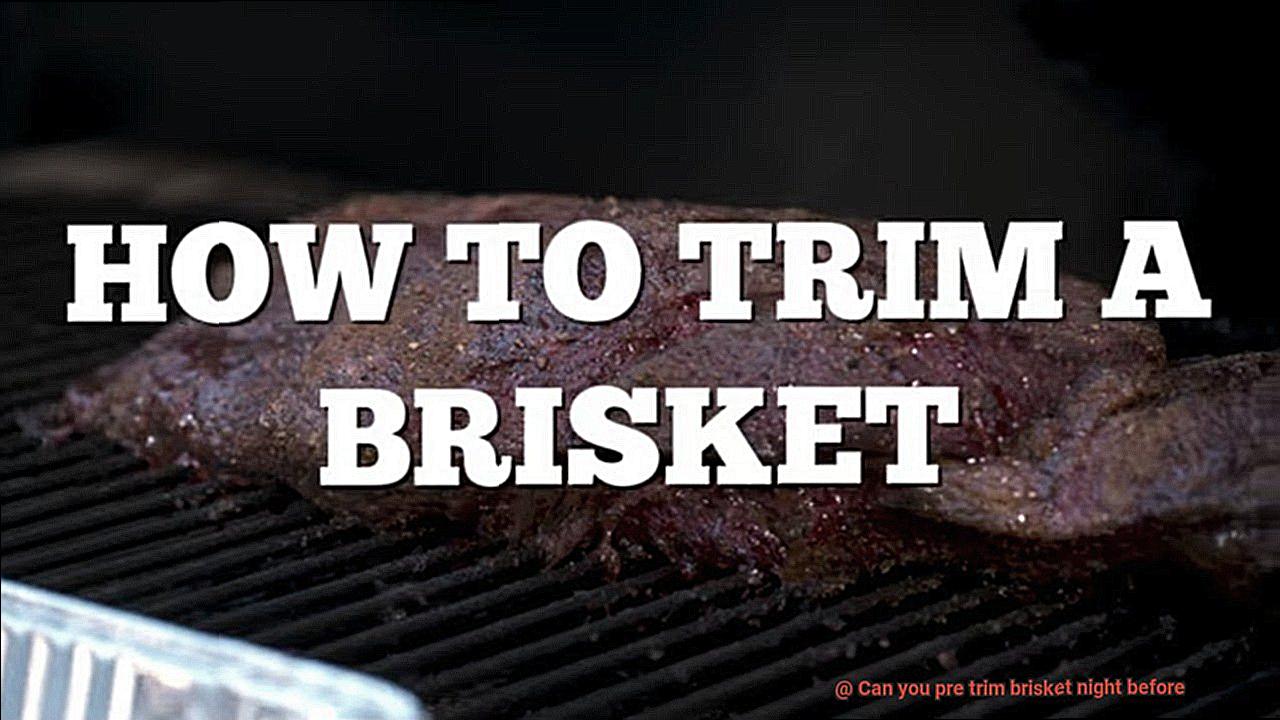
Get ready to unleash your secret weapon for barbecue perfection – pre-trimmed brisket done right.
Contents
What is Pre-trimming?
Mastering the art of grilling a delectable brisket requires more than just skill and patience. It requires a crucial step known as pre-trimming. In this blog post, we will delve into the concept of pre-trimming, exploring its purpose and the benefits it brings to the table. Get ready to discover how pre-trimming can elevate your brisket game to a whole new level.
Removing Excess Fat:
Picture this: a succulent, juicy bite of brisket bursting with mouthwatering flavor. Pre-trimming plays a vital role in achieving this taste sensation by removing excess fat from the meat. This allows seasoning and smoke to penetrate evenly, infusing every fiber with irresistible savoriness.
Promoting Even Cooking:
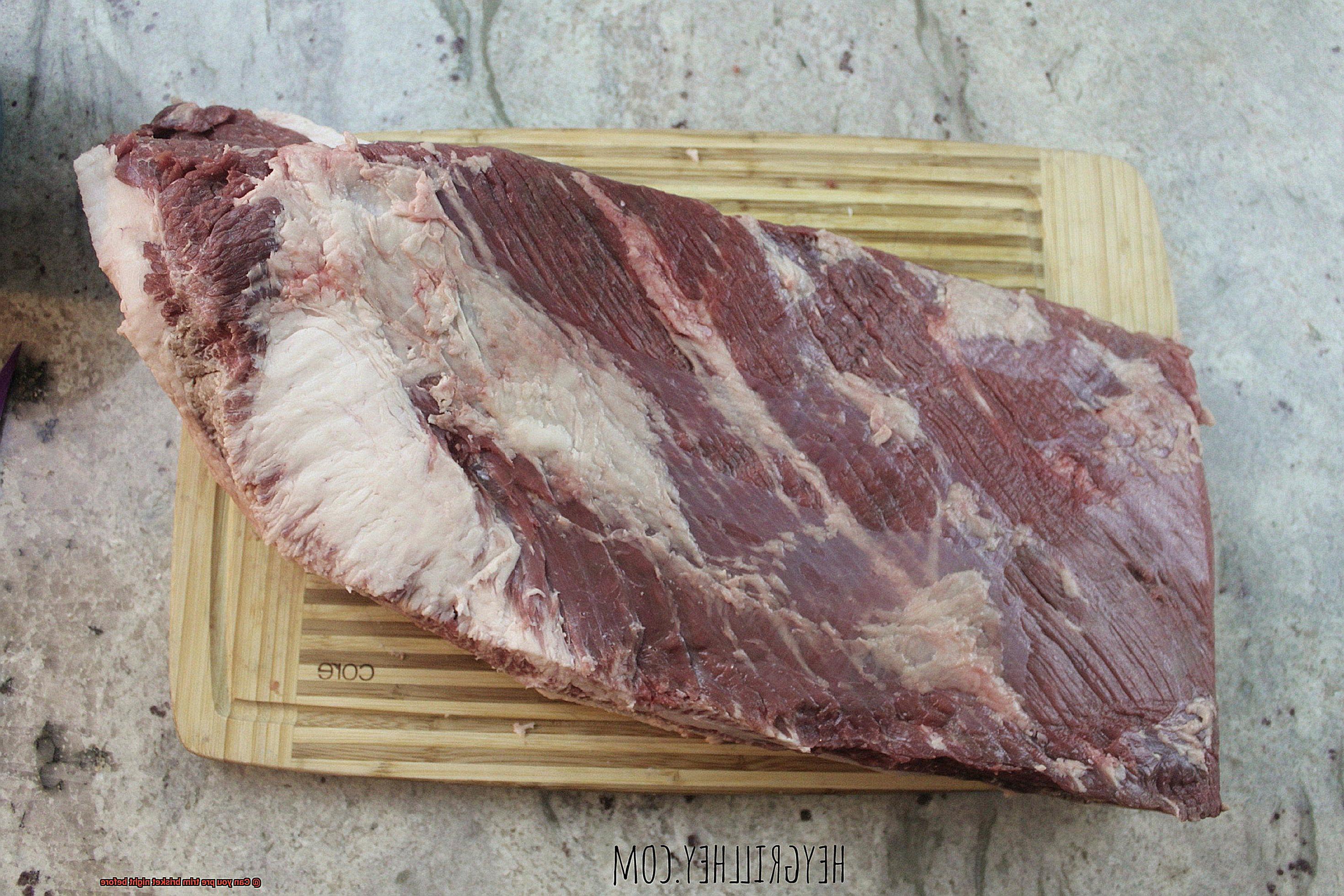
Say goodbye to those dreaded overcooked or undercooked sections of brisket. Pre-trimming eliminates the problem of uneven heat distribution caused by a hefty fat cap. By creating a uniform thickness throughout the meat, pre-trimming ensures that each slice is grilled to perfection, tender and juicy from edge to edge.
Enhancing Tenderness:
Brisket’s reputation for toughness is no match for pre-trimming. By exposing more surface area to heat and smoke, pre-trimming facilitates the breakdown of collagen, transforming tough connective tissues into melt-in-your-mouth tenderness. Bid farewell to chewiness and embrace the velvety texture that only a properly pre-trimmed brisket can offer.
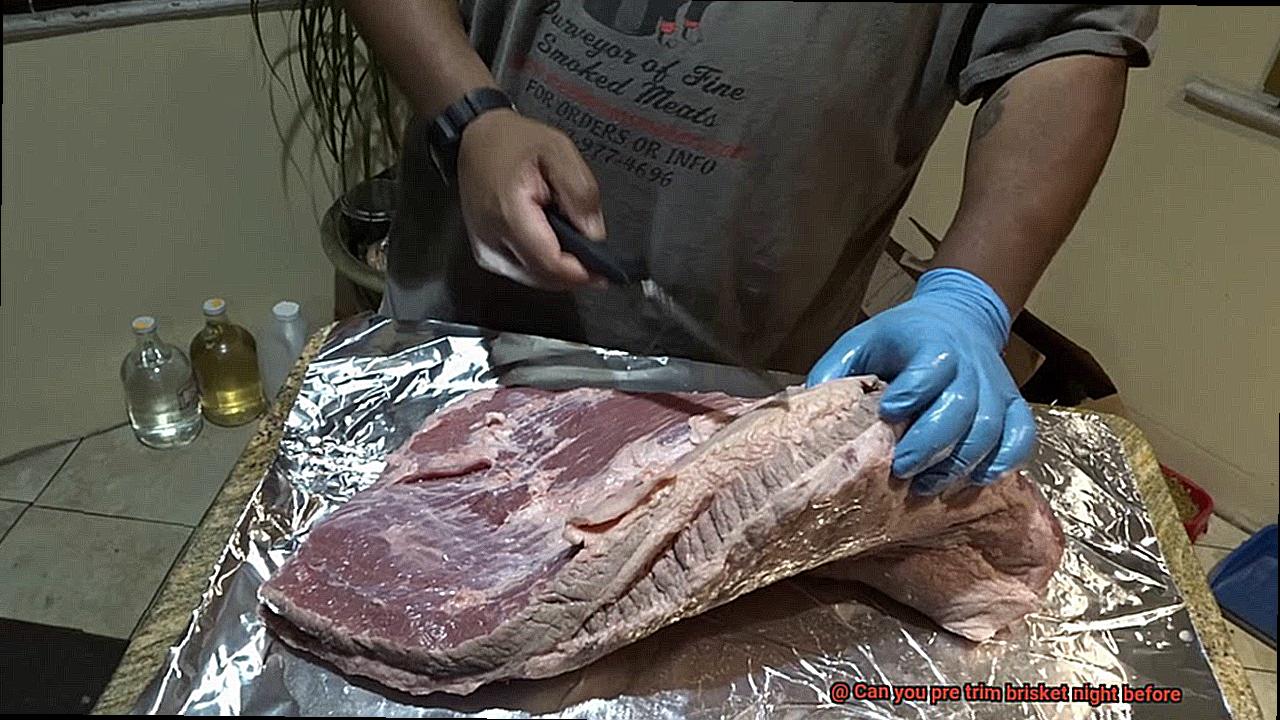
Do it with Precision:
Pre-trimming may be an essential technique, but it requires precision to avoid potential pitfalls. While removing excess fat is crucial, be mindful not to overdo it and risk a dry, lackluster brisket. Leave just enough fat on top to add moisture and richness during cooking. And remember, avoid cutting into the lean portions of the meat, preserving their tenderness.
Considerations When Pre-trimming the Night Before
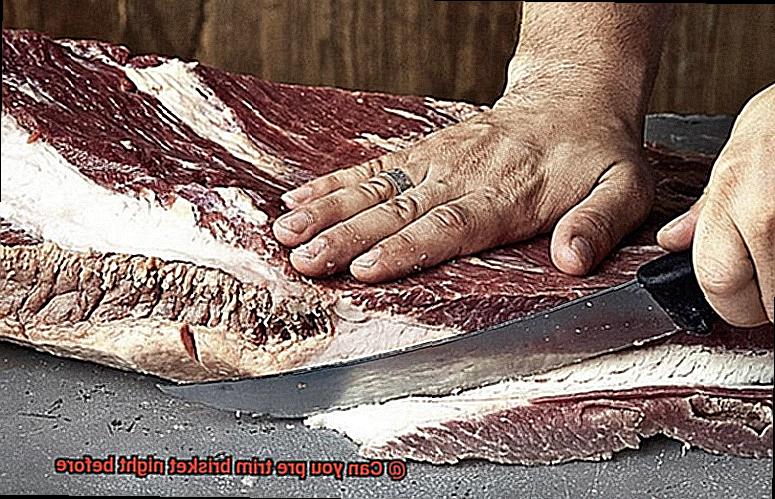
If you want to achieve a perfectly trimmed and mouthwatering brisket, pre-trimming the night before is a game-changer. But before you dive in, there are some key considerations to keep in mind.
First and foremost, timing is everything. While pre-trimming can save you time on the day of cooking, it’s crucial to plan ahead and allocate enough time for the trimming process. Give yourself plenty of time to work your magic without feeling rushed or stressed.
Next, let’s talk about storage. Once you’ve expertly trimmed your brisket, proper storage is essential. To prevent moisture loss and drying out, wrap that beauty up tight. Consider using an airtight container or tightly wrapping it in plastic wrap. Alternatively, seal it up in a resealable plastic bag, removing as much air as possible.
Of course, food safety is paramount. Keep meat at safe temperatures to avoid bacteria growth. Refrigerate that pre-trimmed brisket at or below 40°F (4°C). In hot climates or during summer months, store it in a cooler with ice packs for extra peace of mind.
Now, let’s address moisture loss. Pre-trimming can result in some moisture loss from the meat, but fear not. Leave a thin layer of fat on the trimmed meat to retain moisture during cooking. This ensures a tender and flavorful final product.
And finally, seasoning. While pre-trimming allows for advance seasoning, hold off on adding salt until just before cooking. Salt can draw out moisture and potentially dry out your masterpiece. If you can’t resist seasoning ahead of time, store it in a container that allows for even distribution and prevents leakage.
Remember, pre-trimming requires skill and experience. If you’re new or lacking confidence, seek guidance from an experienced butcher or watch instructional videos before taking on the challenge.
Potential Issues with Pre-trimming
Pre-trimming your brisket may seem like a time-saving move, but it’s important to consider the potential issues that can arise. Moisture loss is one of the primary concerns. The fat cap on the brisket acts as a protective layer, locking in the juicy goodness during cooking. By removing this fat cap before grilling, you increase the chances of moisture evaporating from the meat, resulting in a drier end product. And let’s face it, nobody wants a dry brisket.
Another issue to be mindful of is bacterial growth. When you expose meat to air and leave it at room temperature for too long, you’re practically rolling out the red carpet for bacteria. It’s like throwing a party for those little guys, and trust me, they don’t bring good vibes to your kitchen. So, proper storage and minimizing cross-contamination risks are crucial.
Uneven cooking is yet another challenge that pre-trimming can present. The fat cap not only retains moisture but also acts as an insulator, protecting certain areas of the meat from direct heat. Without it, trimmed sections may cook faster than others, resulting in an inconsistent texture and doneness. And we all want that brisket to be perfectly tender throughout.
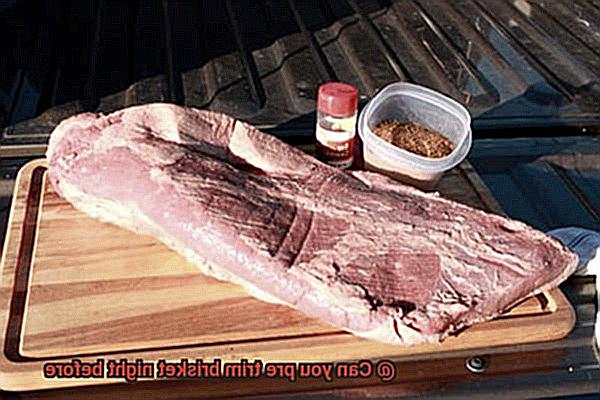
But let’s not forget about flavor. Removing too much fat before cooking can alter the taste profile of your brisket. The fat contributes to its flavor and tenderness, so going overboard with the trimming might leave you with a less flavorful end result. And we all want maximum flavor explosion in every bite, right?
And finally, let’s talk bark, my fellow grill masters. That crispy outer layer that forms during smoking or grilling adds texture and flavor to our beloved brisket. But pre-trimming can make it challenging to achieve that thick and flavorful bark we crave. Without sufficient fat and connective tissue on the surface, our bark game might suffer.
So, before you break out the trimming shears, weigh the convenience against these potential pitfalls. Moisture loss, bacterial growth, uneven cooking, flavor alteration, and bark challenges are all part of the pre-trim equation. It’s up to you to make an informed decision based on your personal preferences and grilling goals.
A well-prepared brisket is a thing of beauty. So, if you decide to pre-trim, plan ahead, wrap it up tight, keep it cool, leave a protective layer of fat like armor, and hold off on adding salt until just before cooking. And if you’re feeling unsure, seek guidance from an experienced butcher or watch instructional videos to ensure your brisket shines with mouthwatering perfection.
Storage Tips for Pre-trimmed Brisket
While pre-trimming can enhance flavor and tenderness, it’s essential to store your pre-trimmed brisket properly to maintain its freshness and ensure a mouthwatering result. In this article, we’ll share some storage tips that will help you enjoy a perfectly cooked brisket every time.
Wrap it up tight:
After pre-trimming your brisket, wrap it tightly in plastic wrap or aluminum foil. This will keep the meat moist and prevent it from drying out. You want to lock in all those delicious juices. By creating a barrier between the meat and the air, you’ll ensure that your brisket stays tender and flavorful.
Protect it from the air:
To provide an extra layer of protection against air exposure, place the wrapped brisket in a resealable plastic bag or airtight container. Oxygen is the enemy when it comes to storing meat, as it can lead to oxidation and spoilage. By sealing your brisket in an airtight environment, you’ll preserve its quality and taste.
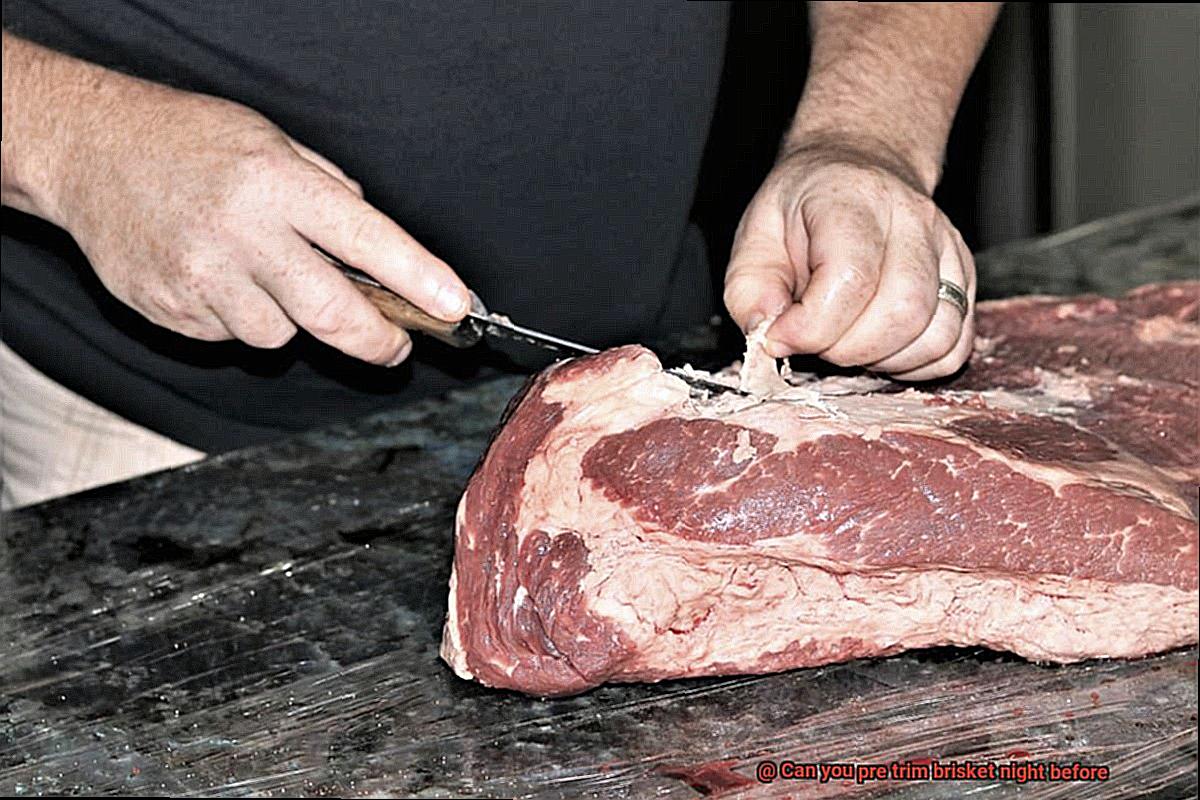
Chill, don’t spill:
Storing your pre-trimmed brisket in the refrigerator is a must. The cold temperature slows down bacterial growth and preserves the quality of the meat. Be sure to place the brisket on a tray or dish to catch any drippings and prevent cross-contamination with other foods. This not only keeps your refrigerator clean but also ensures that your brisket remains safe to consume.
Timing is key:
For optimal taste and texture, consume your pre-trimmed brisket within 3-4 days of refrigeration. Beyond that time frame, there’s a higher risk of spoilage and loss of quality. So plan your meals accordingly and enjoy your brisket at its prime. Remember, freshness is key to a mouthwatering grilling experience.
Freeze for future feasts:
If you plan on storing your pre-trimmed brisket for an extended period, freezing is your best bet. Wrap it tightly in multiple layers of plastic wrap or aluminum foil, or use a heavy-duty freezer bag. Remember to remove as much air as possible to prevent freezer burn. Properly frozen brisket can be stored for up to three months without significant loss of quality.
Thaw with care:
When it’s time to thaw your frozen pre-trimmed brisket, transfer it to the refrigerator and allow it to thaw slowly. This helps maintain the texture and flavor of the meat. Once thawed, cook it promptly – don’t refreeze thawed meat. By following proper thawing techniques, you’ll ensure that your brisket retains its juicy tenderness and delicious taste.
Marinating or Seasoning After Pre-trimming
Grilling the perfect brisket is an art form that requires careful consideration at every step. Among the myriad of decisions, one crucial choice facing pitmasters and barbecue enthusiasts is whether to marinate or season after pre-trimming.
This age-old debate has ignited fiery discussions, with each method boasting its own set of advantages and disadvantages. In this comprehensive guide, we will explore the merits of marinating and seasoning after pre-trimming, equipping you with the knowledge to make an informed decision and create a flavor profile that will tantalize taste buds.
Marinating After Pre-Trimming:
Marinating is a time-honored technique involving immersing the meat in a flavorful liquid mixture before cooking. One of the key advantages of marinating after pre-trimming is its unparalleled ability to infuse the meat with deep, rich flavors. By removing excess fat, you establish direct contact between the marinade and the meat, enabling it to permeate every fiber and create a harmonious symphony of taste. Furthermore, marinating after pre-trimming prevents the pesky obstruction of excess fat from impeding the marinade’s journey to reach the heart of the meat.
However, it is important to note that marinating after pre-trimming requires meticulous planning. To ensure maximum flavor absorption, it is recommended to marinate for at least a few hours or overnight in the refrigerator. This method is ideal for those who are willing to invest time in preparation, seeking a flavor profile that resonates deeply and leaves a lasting impression on their palate.
Seasoning After Pre-Trimming:
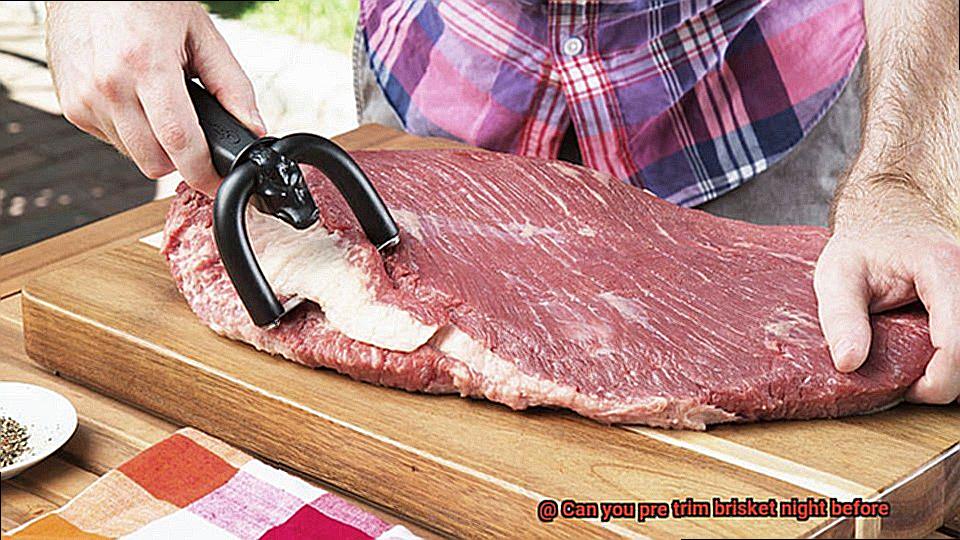
Seasoning, on the other hand, involves skillfully applying a medley of dry spices and herbs onto the surface of the meat. Opting to season after pre-trimming empowers you with ultimate control over your flavor profile. By removing excess fat, you liberate the canvas of the brisket, allowing for an unabashed expression of seasonings. Every bite becomes a gustatory adventure, as the seasoning dances harmoniously with the meat. Moreover, seasoning after pre-trimming prevents spices from being absorbed by fat and succumbing to the dryness that can plague lesser cuts.
Another tantalizing benefit of seasoning after pre-trimming is the creation of a flavorful crust when cooked. The seasoning eagerly clings to the surface of the meat, melding with its natural juices to form an irresistible outer layer. Whether smoked or grilled, this method ensures a sensory experience that evokes boldness and depth, captivating even the most discerning flavor connoisseurs.
Pros and Cons of Pre-trimming the Night Before
When it comes to grilling the perfect brisket, the decision of whether to pre-trim the night before is a hot topic among grill masters. As an expert in the field, I am here to break down the pros and cons of this technique, helping you make an informed choice that will result in a mouthwatering brisket that leaves your guests begging for more.
The Pros of Pre-trimming:
- Time-saving: Pre-trimming the night before frees up precious time on the day of cooking. Say goodbye to tedious hours spent trimming fat and silver skin. With a pre-trimmed brisket, you can focus on other preparations or savor a leisurely morning before firing up the grill.
- Convenience at its finest: Whether you’re hosting a gathering or have a jam-packed schedule, pre-trimming offers unparalleled convenience. Imagine having a perfectly trimmed brisket ready to cook whenever you need it. No more rushing or stressing about getting everything done on time – just grab the brisket from the fridge and start grilling.
- Flavorful infusion: By exposing more surface area through pre-trimming, you create countless opportunities for marinades, rubs, and seasonings to penetrate deep into the meat. Overnight, these flavors meld and infuse, resulting in a tastier and more well-seasoned brisket that will have your taste buds dancing with delight.
The Cons of Pre-trimming:
- Moisture loss risks: With greater surface area exposed, there is a potential for moisture loss during the overnight period. As brisket is relatively lean, retaining moisture is crucial for achieving that coveted juicy and tender final product. Proper storage and covering can help mitigate this risk and maintain optimal moisture levels.
- Beware of oxidation: Prolonged exposure to air can lead to oxidation, which can negatively impact taste and quality. While proper storage techniques can help prevent this issue, it’s essential to handle the pre-trimmed brisket with care to maintain its freshness and prevent any unwanted off-flavors.
- Limited flexibility: Once you’ve pre-trimmed your brisket, you’re committed to that specific trim. If you suddenly have a change of heart or stumble upon a new trimming technique, you won’t have the option to adjust on the day of cooking. This lack of flexibility may limit your ability to experiment and adapt to new flavors and styles.
Factors to Consider When Deciding Whether to Pre-Trim or Not
The smoky aroma of a perfectly grilled brisket fills the air, tempting taste buds and bringing people together. But before firing up the grill, a critical question must be answered: should you pre-trim your brisket or not? Fear not, fellow grill enthusiasts. We’re here to shed light on this sizzling debate.
Time Constraints:
For the busy bees with limited hours to spare on grilling day, pre-trimming is a game-changer. By tackling the trimming in advance, you free up precious minutes for marinating, seasoning, and ensuring your brisket reaches its full flavor potential.
Moisture Retention:
To achieve melt-in-your-mouth tenderness, moisture retention is key. Pre-trimming exposes more surface area, increasing the risk of moisture loss during cooking. However, leaving a reasonable amount of fat cap and connective tissues intact strikes a balance between aesthetics and preserving juicy flavors.
Flavor Development:
The fat content in brisket is no ordinary villain; it’s a hero in disguise. As the fat renders down during cooking, it bastes the meat from within, infusing it with irresistible richness. Pre-trimming too much fat compromises flavor, but if using flavorful rubs or marinades that penetrate overnight, pre-trimming may not be detrimental.
Aesthetics and Presentation:
We eat with our eyes first, so presentation matters. Pre-trimming offers an opportunity to shape your brisket into a visually appealing masterpiece. Removing excess fat or uneven portions creates a neater appearance that will have your guests’ jaws dropping. For events or competitions where visual appeal is paramount, pre-trimming is the way to go.
Personal Preference:
Ultimately, it all comes down to personal preference. Some grillers swear by pre-trimming for more control over the final product, shaping and perfecting their brisket to their liking. Others argue for trimming just before grilling to retain moisture and flavor. Embark on a flavorful journey of experimentation to find what works best for your taste buds and grilling style.
mDVd2H9dov8″ >
Conclusion
Yes, you can absolutely pre-trim brisket the night before. In fact, many experienced pitmasters recommend doing so to save time and ensure a smoother cooking process. By trimming the brisket ahead of time, you can focus on other preparations and have more control over the final result.

